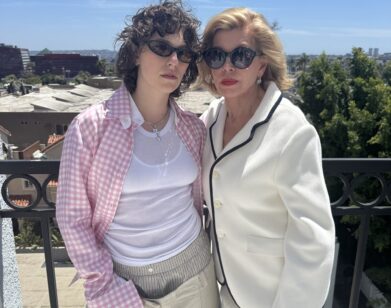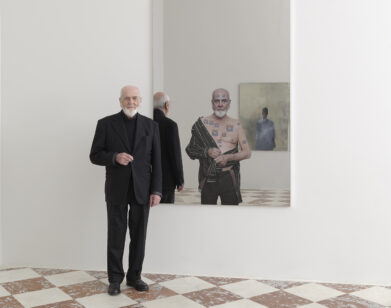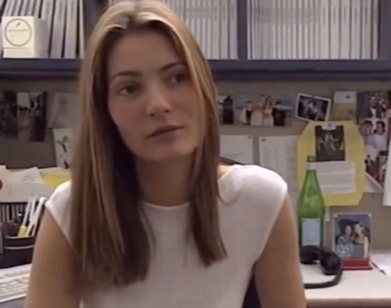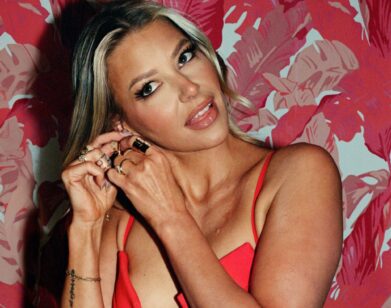Darryl Westly and Vic Mensa Wonder If Art is Ever Really Finished
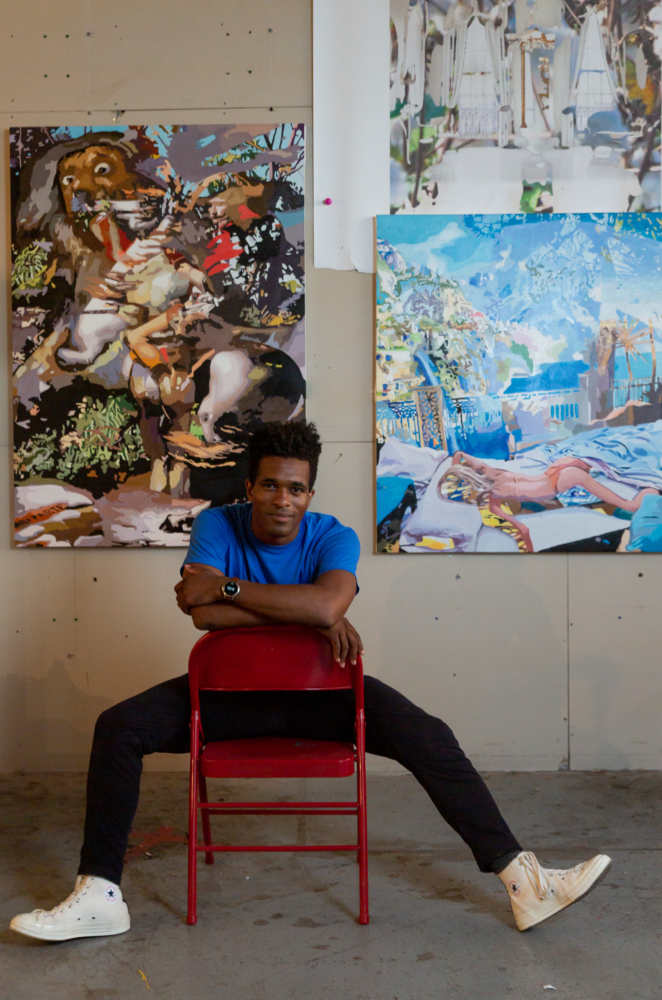
Photo by Ariana McLaughlin.
It’s no secret that art history is woefully short on representation in both its artists and its subjects, all too often putting white bodies at the center of the frame. The Chicago-born, New York-based artist Darryl Westly decided to change that by altering the history of the paintings themselves in his first solo exhibition, Interior/Exterior at the PARISTEXASLA gallery in Los Angeles. In his series, the classic image of a pale European odalisque lounging nude is modernized by a black woman draped in bed, accompanied by her Hello Kitty plushie. The dark hues of past Baroque and Romantic movements melt away into Westly’s hyperrealism, where black subjects in bright, joyful colors dominate the scene. Westly, who worked as a finish painter under Jeff Koons, draws inspiration from online social movements that have pushed issues of culture and identity to the forefront of the national conversation.
But to truly know when one of his works has said everything it needs to, he turns to friends and mentors, like the rapper Vic Mensa, who has grappled with issues that include police brutality and acceptance of the LGBTQ+ community in his music. Both born in Chicago, Westly and Mensa make art that nods to the city as a den of cultural diversity, marred by a stark divide in wealth but brimming with creative vigor. Prior to Westly’s opening on November 16, the artist checked in with Mensa to discuss growing up in Chicago’s Hyde Park neighborhood, ayahuasca revelations, and when (and if) a piece of art is ever really finished. — EVALENA LABAYEN
———
DARRYL WESTLY: So we’ve been talking for a while about going and doing a project together. I’ve been thinking about the work and diversity of music you’ve been putting out. We have that common experience—growing up in Chicago’s Hyde Park, which is an eclectic neighborhood where you’re surrounded by all this history. It’s very racially diverse and you feel like you’re at the center of culture in a way. So it seems natural that its influence would be reflected in the type of music you make and the type of person you are. Thinking about your music and the way in which its composed, I can see that you have this way of making music that reminds me of working on a blank canvas. I find that I need a structure or a substrate, like a drawing before I begin a new work. By having an idea of where the composition is going in, I feel more free to explore the painting’s potential. You have this way of going and weaving together these different ideas with different rhythms, and I’m really curious to know how you know when a song is finished?
VIC MENSA: You know it’s finished once you turn it in? [Laughs.] Once it’s been delivered, once it’s being consumed. Even then, you don’t know if a song is finished because I sometimes will continue to abridge the lyrics, the production, or the line arrangement of a song for years after it’s been out. I might be performing a different version today than I was in 2016. But I have thought about that. There was a song called “Sixteen Shots” a few years ago about Laquan McDonald, and there was one lyric in there—I worked on that song for quite some time, incessantly for months just getting the lyrics right and perfecting things—so I was meticulous with every phrase, with every word. Not just because my subject matter was so dire, but also because I believe in the art. I believe in the creation, so I wanted to see it in its best iteration.
There was one line though that I added after I had released the song. I didn’t figure out until then that the line should have been there whole time, like six months later. So how do you know a song is done? I think it’s at the point when it makes you feel as proud of it as you can be. I’m somebody that continuously perfects work. A lot of the time, the first demo might actually be the best version, but I’ll go in and do thirty versions just because I want to explore the possibilities of what it could be.
WESTLY: That makes a lot of sense to me. Oftentimes I go through anywhere from three to like 10 different designs for one painting before any oil hits the canvas. The composition of a work is the most important part of the making process for me aside from the brushwork. Actually, the idea for this show, Interior/ Exterior first came to me as I was considering how perspective and color can be used as pictorial devices to bring these separate elements together. Later I took the idea a step further by considering how the cultural and social meaning can be attributed to these elements can create a narrative or perspective in the literary sense, unto itself. Where do you find yourself drawing inspiration?
MENSA: I’m primarily taking inspiration from the experiences that I have and the people that I meet, and those experiences are gold. A lot of the time from conversations that I have with people I meet along the way. I got into an Uber the other morning, I said “How ya doing, man?” He says “I’m six feet up instead of six feet down,” and I thought that was so good. I wrote that down and put it into a song. I take inspiration from books I’m reading, from plays; I’m studying acting right now, so I’ve definitely been inspired by that. Taking inspiration from influential minds that came before me and helped to shape my perspective, people like Malcom X, Huey P. Newton, and Fred Hampton; people like Jimi Hendrix and David Bowie, and even Rage Against the Machine. The first shit that ever made me want to rap about it was being on 47th Street and watching this old man with a shopping cart full of random shit washing the windows at the gas station, and I wanted to understand how it is that this man had so little when just up the street, in these mansions near Obama’s crib, they had so much more. I feel like those observations are the best answer for where I take inspiration from.
WESTLY: That experience that you are describing is so unique to Chicago, where you can walk a couple of blocks–especially from areas like Hyde Park–and you’re either surrounded by riches or Section 8. You’re constantly going in and out of these different environments. One man’s trash is another man’s treasure. The first oil painting I produced after leaving Jeff Koons’s studio, Neurosis (2015) was of the selection of candy bars I could find at the local gas station on 53rd Street in Hyde Park, Chicago. For me as a kid, those candy bars represented opulence. Growing up in Chicago made me keenly aware of the ties that bind people to one another. Race, class, and ethnicity particularly. With my work, I’ve wanted to break down these barriers that separate us from one another by focusing on recurring motifs and translating them into a visual language that juxtaposes them against one another. There is a sense of empathy that I hear from the music you’re sending out there. You’re going and putting yourself in the shoes of others and seeing their perspective. Has your approach to music changed since you first started to now?
MENSA: In a lot of ways, my approach has always changed. My process has been up and down. I went through periods where I couldn’t write anything if I wasn’t high on mushrooms or molly. Then there would be other times when I needed to be completely sober. More recently, the writing process has felt very different conceptually. I would sit down and write free form lyrics, with the concept or idea in mind, just no musical element to it, with no flow or melody. In a way, I’ve started to put together or pick up the pieces. As an artist, I keep trying to make music specifically for me, but as the political climate is changing the nation—particularly in the time of the murder of Laquan McDonald and the prevalence of imagery of police brutality coinciding with the election of Donald Trump—I think my approach has become overtly political. I think I always had some jewels or seeds of revolutionary thoughts, but as the landscape has become more blatantly political, so has the music.
WESTLY: Do you see a difference in terms of art that is political or apolitical? Or do you think you occupy both spheres?
MENSA: Yeah man, I was reading a Maya Angelo quote yesterday which said, “People will forget what you said, people will forget what you did, but people will never forget how you made them feel,” and I do think that. I feel like something that may not be overtly coming with a message or be on-the-nose in a political “fight the power” way, can still be revolutionary, and still be political. I had a friend recently ask me about the politics of my music videos and lyrics—“certain things I get, the police killing a kid in Chicago, I get that,” but he felt like it was disjointed when I did a song called “Free Love” in support of the LGBQT+ community. He was like, “Why? I don’t get it.” It occurred to me that to make those statements and support the solidarity of any repressed group was not interchangeable with another. To me, if you’re in support of the autonomy of people of color, then you also should be in support of the autonomy of indigenous people or people of different sexualities because at the end of the day, they are all minorities and all are victims of attack.
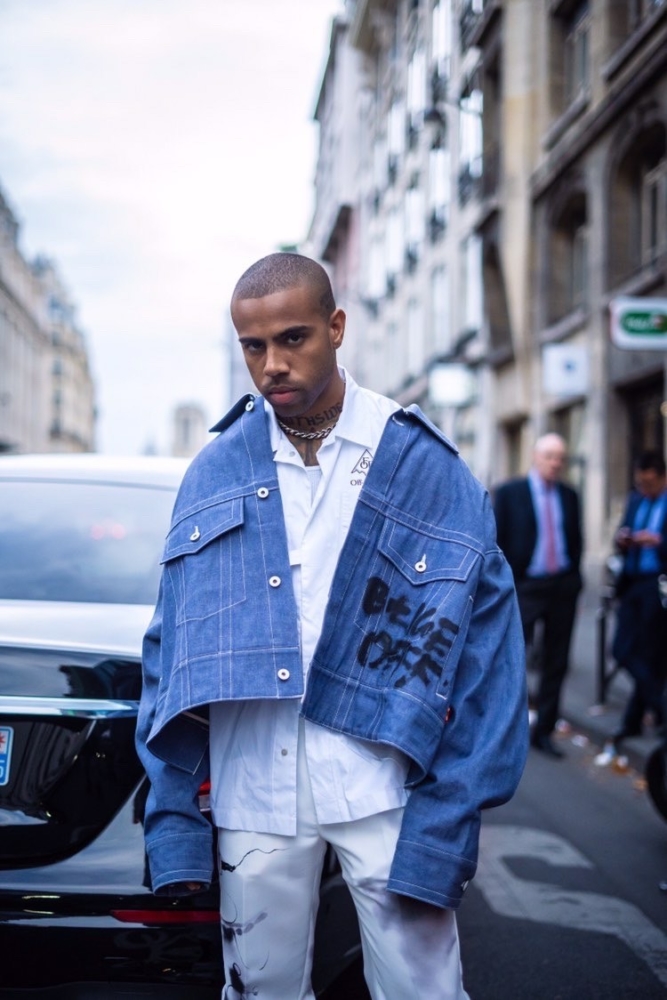
Photo by David Prutting for BFA.
WESTLY: I believe the problem occurs when we step back and realize that race relations and cultural identity are not a blank slate from which we all start at square one. In some of my work, I’ve depicted images of old slave quarters from Charleston and juxtaposed them against lush foliage and colors. At certain points, the background and foreground merge as if to say this is one shared space. The derelict slave quarters and the lush garden are one and the same, just as our history as Americans is one and the same. That’s part of the strength in terms of our art, in terms of allowing the conversation. At the end of the day it’s hypothetical, but it allows people to take a step back and look outside of themselves and question the importance of taking a stance. We are either a part of the group or outside of it.
MENSA: I believe that a function of my music and things that I’ve said in public and my art in general has definitely been a force for conversations and pushing buttons to make people talk about things that matter. I just get fatigued with constant force-feeding of useless information. I was having a convo with my homie the other day, my man Towkio, he posed a hypothetical question to me the other day. He said, “If you were a king and you wanted to keep your subjects from revolting, what would you do?” I was thinking I’d give them just enough to feed their families, enough to keep them happy. Tokio was like, “What if you took it a step further and you put something in the bread to neutralize them, you know?” And I was like, “That’s some white-people shit,” and it really is, but that’s what’s happening with the media that we consume. Whether it’s the news or social media, literally, we are being fed neutralizing agents to keep us mentally dull.
WESTLY: That’s something I really relate to there. That’s something that I consider in my work, recognizing that, through what you produce, trying to give people breadcrumbs to let them find out for themselves, and that’s something I feel that you really accomplish with your work. Being that provocateur, saying this is a metaphor for what’s happening, and it’s a matter of people being able to understand, once they have that information, figuring out what to do next. You feel that your music gives people the means for understanding what is happening around them, you’re giving specific moments and insights into what is happening saying: “This is what the king is feeding you.”
MENSA: That’s definitely been a primary motivator in my music. I think first and foremost my motivation has always been to express myself in an authentic way, and to process my own situations as a form of catharsis, another primary motive has been to inform, bring the truth to the people. I experienced an ayahuasca ceremony the other day, and I was given a download of information from the plants. I know that sounds crazy, but it was real, and what it said was: “Your purpose is to bring truth to the people, that is your purpose.” I’ve always felt a need to do that.
WESTLY: In making art, I’ve come to realize the power that joy can bring, whether through beauty and experience, or simply through the highlighting of a personally held experience or belief. I believe that painting has the unique ability to represent multiple states of being at once. It’s not beholden to the past like a photograph, but is strictly tied to the present, as a reflection of ourselves within the particular moment in which we choose to digest it. The thing about your music is that it’s not always bringing the bad news. It also uplifts, there’s some enjoyment, there’s beauty, there’s excitement, there’s love. Again, that speaks to your eclecticism as an artist.
MENSA: All of those things, man. I think truth does not always hurt. It’s pretty liberating when you see it for what it is. Although it can be a burden sometimes to have your eyes open, once you recognize it, there’s so much power and so much beauty in seeing, and I think it motivates you to see the things that are fucked up in a realistic way. You see a juxtaposition, you see this isn’t your fate, you’re not resigned to this. In America, when you have a real perspective and you understand how that man on 47th Street ended up washing windows next to mansions, it gives you motivation to speak up about it and to find solutions.
WESTLY: One hundred percent. I guess that answers my first question, too, about when is a work of art finished. I think that it is when it’s honest.
MENSA: Word. Yeah, that’s real. When it’s an honest reflection of a moment in time, I would agree that’s when its finished.
WESTLY: Sick.

